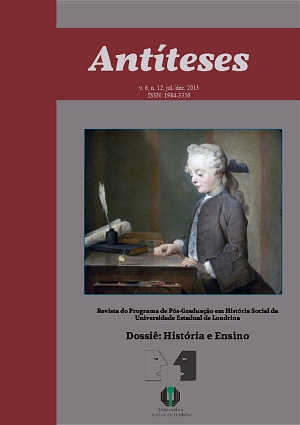The mask of crime: the representative of Brazilian's intelligence and fatality in a Hotel's rat memories
DOI:
https://doi.org/10.5433/1984-3356.2013v6n12p579Keywords:
João do Rio, History and literature. Criminal figureAbstract
Our research, developed with the post-graduation program in Social History from the State University of Londrina, has as focus the figure of the criminal character in the literature of the XIX and XX centuries, based on the observations of the carioca short story, chronicle and novel writer João do Rio (Paulo Barreto, 1882-1921) in the romance Memórias de um rato de hotel, a vida do Dr. Antônio contada por ele mesmo, published as a serial in the journal Gazeta de Notícias do Rio de Janeiro between December of 1911 and May of 1912. Published, by the time, as memories truly written by Dr. Antônio himself - real criminal who ends his life of crime arrested at the Detention House - the romance seems to have received notoriety by its carioca readers, gaining a book edition just three months after the conclusion of the periodic. In our study perspective, this novel-feuilleton has in itself rich possibilities of historical interpretations about the criminal figure, because in its text we can see components of a kind of literary tradition that had been molding since the XIX century - and admitted as "crime literature" by some researchers, with the field observations from the chronicler-journalist whose vanity, according to the writer, was to make a kind of analyses of the contemporary time - which would end up in some kind of literacy project based on what people understand by ethnographic temperament. The aim is to think over the conditioning of the criminal figure in Paulo Barreto's literature, in our research we developed reflections about the literary scenery of Rio de Janeiro at that time, understanding how the emersion of the "masses' likes" seams to affect the thematic and artistic prepositions of many writers. Equally, we also aim to think over the relationship between the literary speech of the chronicle writer and the social scientific and sanitary speeches, always intending to mark the dialogue between what we usually understand as "reality" and the fictional productions of literature - considering that both categories act constantly one over the other and shape themselves mutually according to the multiple determined contexts. Thus, we intend to investigate João do Rio's considerations about the criminal Dr. Antônio - literary mask of the author used to make a chronicle about the capital's underworld of crime and to make the society a carnival - due to the engagement of its literary project, searching the chronicles e tales that seemed interesting to understand the fictional world - which, many times, intended to be real - that were created by this own work. Therefore, our intention of analyses would be to think historically the figure of the criminal in the beginning of the XX century in view of possible latent elements of the imaginary about it, manifested through the literature and shared, in some level, by the readers of the period.Downloads
Download data is not yet available.
References
Não há
Downloads
Published
2013-12-04
How to Cite
MENDES, Lucas Trazzi de Arruda. The mask of crime: the representative of Brazilian’s intelligence and fatality in a Hotel’s rat memories. Antíteses, [S. l.], v. 6, n. 12, p. 579–580, 2013. DOI: 10.5433/1984-3356.2013v6n12p579. Disponível em: https://ojs.uel.br/revistas/uel/index.php/antiteses/article/view/17185. Acesso em: 16 jan. 2026.
Issue
Section
Abstracts of Doctoral Theses
License
Copyright (c) 2013 Antiteses

This work is licensed under a Creative Commons Attribution 4.0 International License.
The journal reserves the copyright on the contributions published, without material compensation for the author, and may make them available online in Open Access mode, through its own system or other databases; you can also make normative, orthographic and grammatical changes in the originals, in order to maintain the cultured standard of the language, with the final consent of the authors. The opinions expressed by the authors are their sole responsibility.










